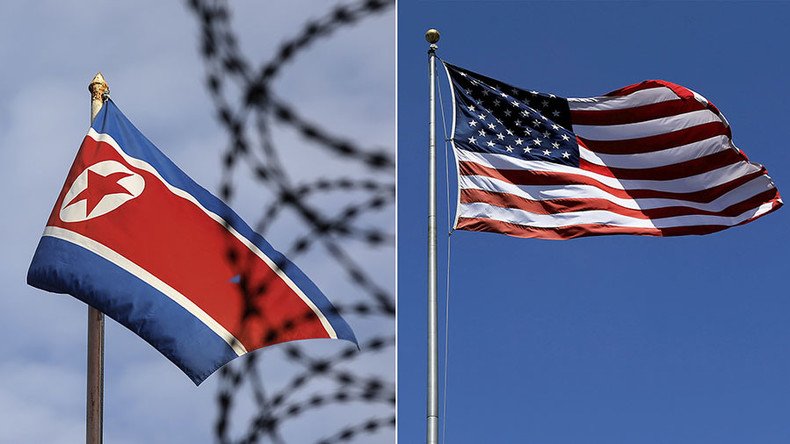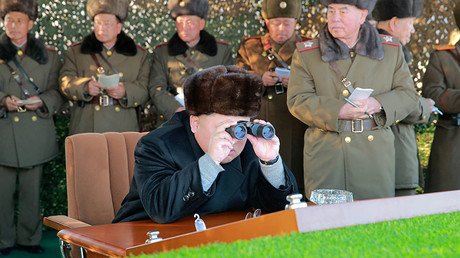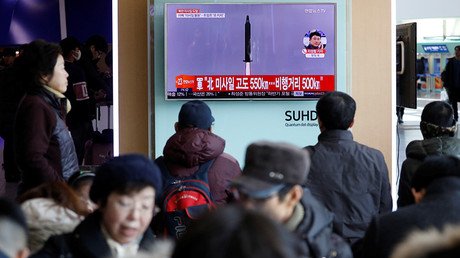Unofficial US-North Korea talks dropped after State Dept denies visa to top official – report

The first talks planned between Washington and Pyongyang in years have reportedly been canceled, as the US State Department denied entry to a high-level North Korean diplomat, with the North’s recent missile tests and Kim Jong Nam’s murder also possible factors.
The low-key talks between former US officials and Choe Son Hui, the director-general of the American affairs bureau in the North Korean Foreign Ministry, were set to take place between March 1 and 2 in New York, but Choe was denied a visa, the Wall Street Journal reported on Saturday, citing sources familiar with the matter.
The rationale behind scuttling the meeting was not immediately clear, but the report said Pyongyang’s latest ballistic missile test and the assassination of Kim Jong-nam, the half-brother of North Korean leader Kim Jong-un, may have played a role.
State Department officials have refused to comment on the reason Choe’s visa was denied, saying it does not comment on “the details of individual visa cases.” Earlier, the Washington Post wrote that issuing a visa to the North Korean diplomat would signal the administration’s approval of the talks, which were arranged independently of the State Department due to their unofficial nature.
Nonetheless, the US-North Korea meeting in New York would have been the first in the US since 2011 and involved some top-tier officials from both sides. As a career diplomat, Choe served as an aide and interpreter during the six-party talks on North Korea’s nuclear weapons program and other high-level meetings, including former US President Bill Clinton trip to Pyongyang in 2009.
The Americans would have been represented by Robert Gallucci, the chief US negotiator during the 1994 crisis over North Korea’s nuclear program, and Victor Cha, who served as the National Security Council’s director for Asian affairs under the George W. Bush administration. The New York meeting itself was arranged by Donald Zagoria, a consultant on Asian affairs in President Jimmy Carter’s administration
While little is known about the proposed agenda, it is believed that the meeting was arranged to find common language and explore the prospects for official talks. Since Donald Trump became president, Pyongyang has not made any of the bombastic threats that it showered on the Obama administration.
Notably, in his interview with Reuters on Thursday, Trump did not completely rule out the possibility of meeting with North Korean leader Kim Jong-un in the future under certain circumstances, but added that the opportunity may have already been lost. “It’s very late. We’re very angry at what he’s done and, frankly, this should have been taken care of during the Obama administration,” he said.
Diplomacy aside, tensions between Washington and Pyongyang began spiraling upwards once again in February due to a number of recent developments in the Korean peninsula.
Japan is discussing the deployment of the US missile defense systems, THAAD and Aegis Ashore, which Pyongyang sees as a manifestation of “hostility” from Washington
Meanwhile, Pyongyang has been accused of undermining regional security by testing its newest intermediate-range ballistic missile, which is capable of reaching US military bases in South Korea and Japan. The US has also attributed the assassination of Kim Jong-nam in Malaysia, which reportedly involved a VX nerve agent, to the North Korean regime, though the official results of the Malaysian investigation have yet to be released.
“This is pretty serious stuff… To use a VX nerve agent in open space is essentially an act of terror. This is certainly a setback to any effort to put things on a diplomatic track,” Cha told the Wall Street Journal.
Until 2008, North Korea was on the State Department’s notorious list of “state sponsors of terrorism,” along with Iran, Syria, and other countries. The designation generally prohibits arms-related exports and sales, as well as economic assistance and financial transactions involving the blacklisted country.














